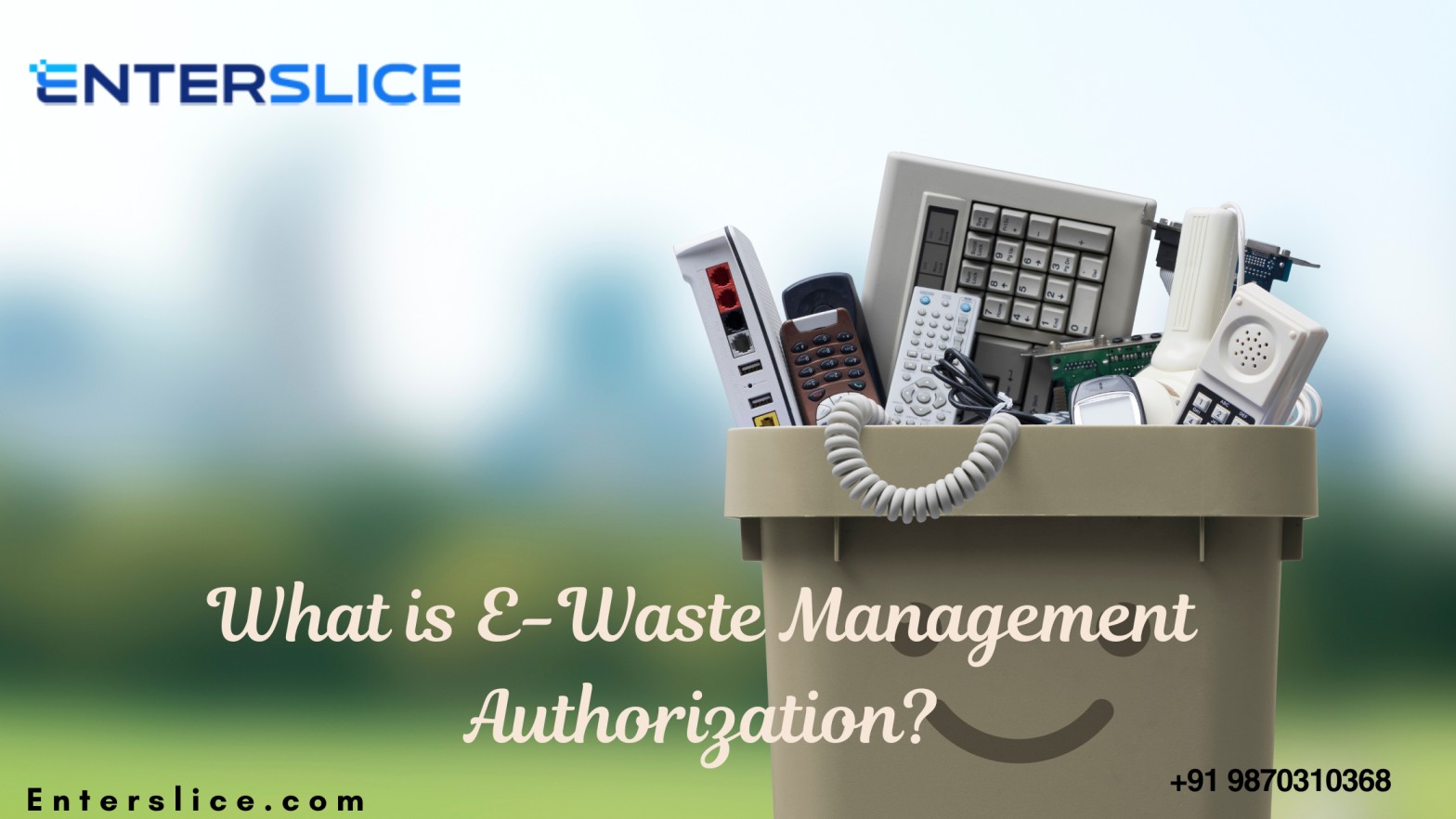E-Waste Management Authorization: A Complete Business Guide

In today’s digital age, electronic devices are indispensable. From smartphones and laptops to televisions and printers, technology plays a vital role in our daily lives. However, when these devices reach the end of their lifecycle, they turn into electronic waste—or e-waste—which poses serious environmental and health hazards.
That’s where E-Waste Management Authorization comes into play. Whether you’re a manufacturer, importer, refurbisher, or recycler, obtaining this authorization is not just a regulatory obligation—it’s a proactive step toward sustainability and legal compliance.
What is E-Waste Management Authorization
E-Waste Management Authorization is formal approval granted by the Central Pollution Control Board (CPCB) or State Pollution Control Board (SPCB) under India’s E-Waste (Management) Rules, 2016. It permits businesses involved in the generation, collection, storage, transportation, dismantling, or recycling of e-waste to operate legally.
The main goal is to ensure that hazardous substances like lead, mercury, and cadmium found in electronics are handled safely. Proper authorization helps prevent environmental pollution and promotes responsible recycling practices across the supply chain.
Why Does Your Business Need This Authorization?
If your business deals with Electrical and Electronic Equipment (EEE), obtaining E-Waste Management Authorization is mandatory. Operating without it can expose your business to legal liabilities and damage your reputation. Here’s why it’s essential:
- Legal Compliance: Non-compliance can lead to penalties, shutdowns, and bans on operations.
- Environmental Responsibility: Proper disposal of e-waste supports eco-friendly practices and sustainable development.
- Enhanced Brand Reputation: Customers and investors prefer businesses committed to social and environmental responsibilities.
- Eligibility for Contracts: Government and private sector contracts often mandate environmental compliance.
Who Needs E-Waste Management Authorization?
Authorization is required for a wide range of businesses that deal with electronics in any part of the supply chain. This includes:
- Manufacturers of electrical and electronic equipment
- Importers bringing electronics into India
- Refurbishers involved in extending the life of old devices
- Recyclers and dismantlers handling end-of-life products
- Collection centers and aggregators
- Extended Producer Responsibility (EPR) entities responsible for take-back and disposal
If you belong to any of these categories, applying for authorization should be a top priority for staying compliant.
How to Apply for E-Waste Management Authorization
Applying for E-Waste Management Authorization involves several steps and documentation requirements. Here’s a step-by-step guide to help you understand the process:
1. Prepare Required Documents
Ensure you have all necessary documents, such as:
- Business registration certificate
- GST registration
- PAN card
- Site plan/layout
- List of equipment and waste processing methods
- Consent to Operate under Air and Water Acts
2. Online Application Submission
Visit the CPCB or relevant SPCB portal and fill in the application form. Upload all required documents and submit the form.
3. Inspection and Review
Authorities may conduct an on-site inspection to assess the infrastructure and safety measures for handling e-waste.
4. Authorization Issuance
If everything is in order, you’ll receive the certificate of authorization, typically valid for five years, subject to renewal.
Key Challenges Faced During E-Waste Authorization
Many businesses, particularly startups and small enterprises, struggle with the complexities of obtaining authorization. Common challenges include:
- Lack of Awareness: Many businesses don’t know they require authorization to operate legally in the e-waste sector.
- Complicated Documentation: Understanding and preparing technical documents can be overwhelming.
- Regulatory Delays: Communication gaps with CPCB/SPCB often delay the process.
- High Compliance Costs: Infrastructure upgrades and consultancy fees can be a financial burden for small entities.
These issues can discourage businesses from pursuing compliance. However, ignoring them can lead to greater costs in the form of penalties or legal action.
How Enterslice Helps You Stay Compliant
Navigating environmental regulations can be complex, especially for businesses without in-house legal teams. That’s where Enterslice steps in. As a trusted legal and compliance advisory firm, Enterslice offers end-to-end support, including:
- Documentation preparation and application filing
- Liaising with CPCB/SPCB officials for timely approvals
- Technical consulting for setting up compliant infrastructure
- Ongoing compliance management and renewal services
With a strong record of helping businesses across India, Enterslice ensures a seamless and hassle-free process, so you can focus on growth while staying legally compliant.
The Road Ahead for E-Waste Management in India
India is the third-largest generator of e-waste globally, producing over 1.7 million tonnes annually. With rapid digital adoption and increasing consumerism, these numbers will continue to rise.
Businesses that align early with sustainable practices and obtain E-Waste Management Authorization will be better equipped to adapt to stricter regulations in the future. More importantly, it sets them apart as responsible and forward-thinking enterprises.
Getting your authorization today isn’t just about compliance—it’s about building a resilient and reputable business.
It reflects your commitment to environmental stewardship.
It builds trust among customers, stakeholders, and regulators.
Authorized businesses are better positioned for government projects and global partnerships.
Take the proactive step—ensure your e-waste practices are legal, ethical, and future-ready.
FAQs
1. Is E-Waste Management Authorization mandatory for all electronic manufacturers?
Yes. All manufacturers, importers, refurbishers, and recyclers must obtain authorization under the E-Waste (Management) Rules, 2016.
2. How long does the authorization process take?
The process generally takes between 30 to 90 days, depending on documentation accuracy and regulatory workflow.
3. What happens if I operate without the authorization?
Operating without authorization is a legal offense. It can lead to hefty fines, suspension of operations, and even legal action from authorities.
4. Is the authorization valid forever?
No. The authorization is usually valid for five years and must be renewed before it expires to avoid compliance issues.



